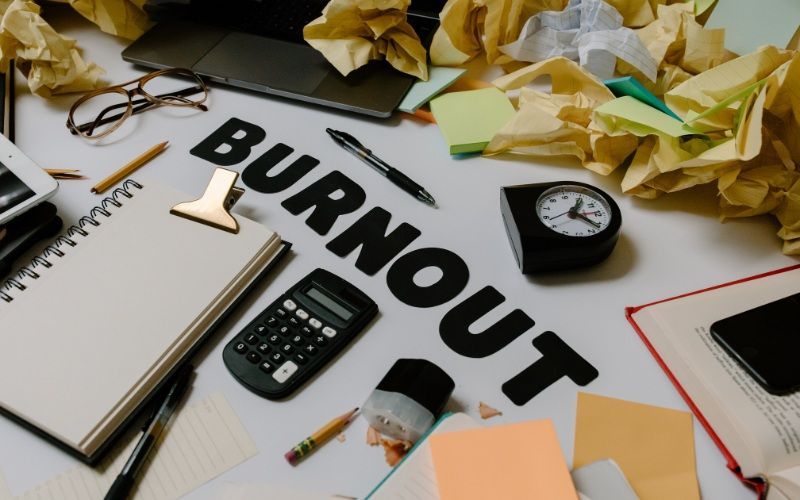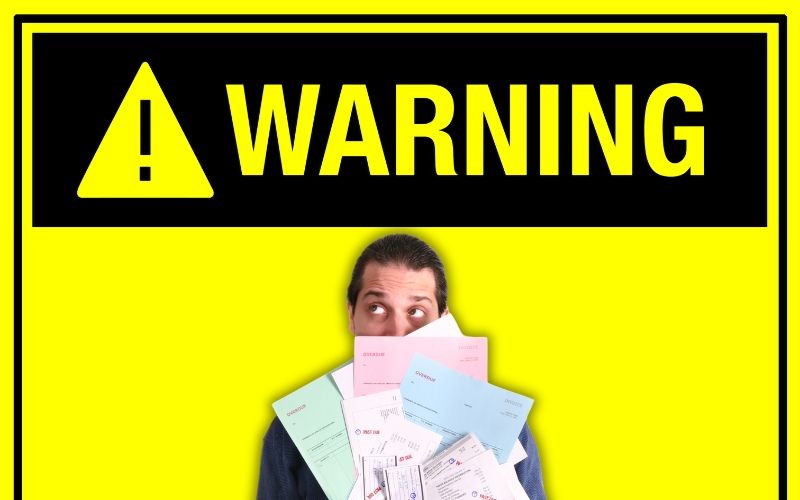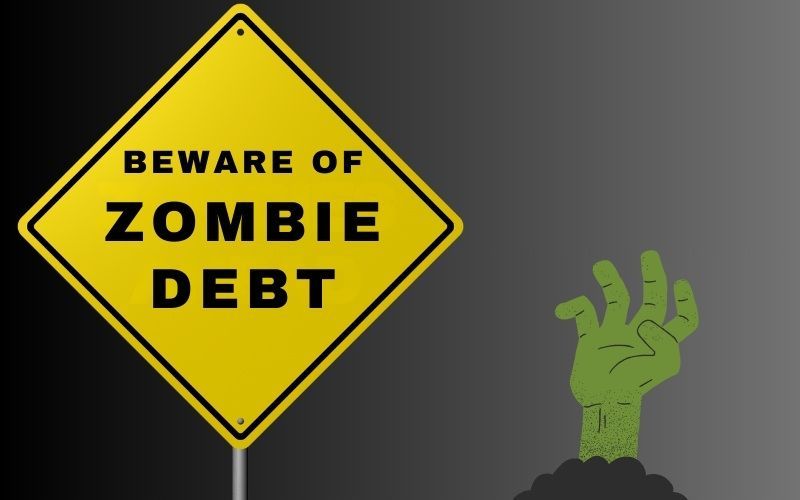Feeling Financial Burnout From Debt Relief?
Last Updated: March 15, 2024
Strategies to Overcome the Emotional and Financial Strain of Debt

In the journey toward financial freedom, the path is often strewn with obstacles that test our resilience, patience, and emotional well-being. One such challenge, frequently overlooked, is the phenomenon of financial burnout, a state of exhaustion where the relentless pursuit of debt relief seems to lead nowhere.
Much like the concept of 'debt fatigue' explored by financial experts, this burnout can engulf individuals in a cloud of despair, making the goal of financial stability appear just out of reach.But what exactly triggers this overwhelming sense of financial defeat, and more importantly, how can you navigate through it to emerge stronger and more financially savvy?
In this post, we will talk about financial burnout, uncovering its roots and offering you a roadmap to reclaim your financial enthusiasm and continue your journey toward a debt-free life with renewed vigor and clarity.
Want to skip the article and speak directly to a debt specialist? Click here for a free consultation.
What’s Ailing You?
Try to think about why you feel so burned out. Perhaps you lost a job due to no fault of your own or suffered a medical setback. If you're grappling with the emotional toll of financial strain, here's how to deal with financial stress. Or, maybe your financial problems aren’t your fault and you feel powerless over the fact that you need to worry so much about your financial situation. Whatever the reason, remember that you made the important first step by enrolling in our debt settlement program to get debt relief and look forward to achieving your long-term financial goals.
Talk About It
If possible, talk about your feelings with an understanding friend or relative. Any kind of personal fear or frustration can seem harder to deal with when it is internalized. If you don’t feel comfortable opening up to someone else about your situation, just being sociable with someone else and laughing out loud can be an amazing cure to whatever troubles you.
Find Accountability Partners
Sharing your financial goals with close friends or family members can provide accountability. Check-in with them periodically on your progress. Having people who support you and keep you focused is invaluable.
You could also join a financial support group, either locally or online. Talking through challenges with others who understand can help you feel less alone.
Go For It
Sometimes frugality makes us feel guilty for wanting to treat ourselves to simple, affordable pleasures. It’s perfectly acceptable and necessary to treat yourself to small indulgences on a regular basis. Frugality isn’t about deprivation. Debt relief works best when you balance your individual wants and needs and work them into a budget that you can stick to.
If a frequent stop for a caramel mocha latte is a special treat and fits into your budget, then cut back on or eliminate something else that isn’t as important. Understanding the debt relief facts you should know can empower your journey toward financial stability.
Set Short-Term Goals
Setting small, achievable financial goals can help provide motivation and a sense of progress.
Examples:
- Pay off one credit card
- Save $500 for an emergency fund
- Reduce restaurant spending by $100 per month
- Cancel an unused subscription service
Celebrate each goal you reach, even if it's just a small treat like your favorite snack. Recognizing your hard work helps build momentum.
Move forward
Try to reassess your life and find out what you need to do to improve your personal situation and outlook regarding your finances. For example, if you lost employment due to downsizing and haven’t found a new job yet, try to think of creative ways to bring in more income.
If you took a look at your situation and discovered you have a spending problem, rather than an income issue, try to examine why you spend too much and get down to analyzing your wants and needs.
Adjust Your Budget
Take a fresh look at your monthly budget. Are there areas you can trim spending, like dining out, entertainment, or impulse purchases? Even small cuts can free up money to pay down debt faster. Consider using a budgeting app to better track spending.
Seek Support
Don't hesitate to ask for help from family or friends if you need temporary assistance or emotional support. Many who care about you will be happy to help ease your stress.
Join a Community
Online forums can connect you with others experiencing financial struggles. You can share tips and encouragement to stay motivated. Facebook groups like Debt Movement provide a supportive community.
Seek Professional Guidance
For personalized guidance, meet with a financial advisor or therapist who specializes in financial stress. They can review your full situation and make expert recommendations on budgeting, debt repayment, and improving your mindset.
Take a Break
It's important to take a step back from your financial worries occasionally. Do an activity you enjoy that provides a mental break, whether it's reading, hiking, or coffee with a friend. You'll return feeling refreshed and better able to tackle money issues.
Review Your Progress

Schedule time every 1-2 months to review your financial progress. Celebrate your wins, like paying off a credit card or adding to savings. If you're veering off track, make appropriate adjustments to get back on a positive trajectory.
Visualize Your Goals
Envision how you'll feel when you become debt-free or achieve other financial targets. Cut out inspiring pictures and words to create a vision board. Reminding yourself of the purpose behind the hard work can re-energize you.
Reward Yourself
Don't wait until you fully pay off debt to celebrate. Choose small rewards along the way to mark milestones, like a movie night after saving your first $1,000. Build anticipation for the next milestone to stay motivated.
FAQs
-
How can I stay motivated with my debt repayment plan?
Set short-term, achievable goals and celebrate when you reach them. Also, visualize how you'll feel when you're debt-free. Having a clear purpose and anticipating future rewards can provide motivation.
-
What if I can't afford professional financial help?
Many non-profit credit counseling agencies offer free or low-cost services. You can also get free guidance from online communities. Budgeting apps and educational blogs/videos offer great tips at no cost.
-
Should I take on a side job to pay off debt faster?
Adding income through freelance work, driving for a rideshare service, or other creative means can definitely speed up debt repayment. Just be sure not to burn yourself out. Make a realistic assessment of what you can handle along with your regular job.
-
How do I curb impulse spending?
To curb impulse spending, start by unsubscribing from marketing emails from retailers, as these can tempt you with deals and products you don't need. Try not to shop as a way to alleviate boredom or stress, as this often leads to unnecessary purchases. Implement a rule for yourself where you wait 24 hours before buying anything that costs more than $20 to give you time to consider if you truly need it. Meal planning and sticking to a grocery list can help you avoid the convenience and expense of takeout. Additionally, using cash instead of credit cards for your purchases can make you more mindful of spending, since you physically see the money leaving your hands. For more tips on managing your finances and understanding the role of financial planning in achieving your money goals, check out our comprehensive guide on financial planning.
-
What if friends/family don't understand my money struggles?
It's your journey, you don't have to justify it to others. Focus on those who support you. Join an online community to connect with those who understand firsthand. Educate close ones who are open to learning about your challenges.
Conclusion
Dealing with financial stress and debt can feel overwhelming at times. Burnout is understandable when managing money feels like a constant struggle. The most important thing is recognizing when you need help and being willing to take steps - both small and large - to improve your situation.
With commitment to your goals, self-compassion, and utilizing available support and resources, you can overcome financial challenges and regain stability. Though the road may be long, focus on progress, not perfection. Be proud of each accomplishment along the way, and know that a brighter financial future lies ahead. You've got this!
If you are struggling with overwhelming debt and want to explore your debt relief options, Pacific Debt Relief offers a
free consultation to assess your financial situation. Our debt specialists can provide objective guidance relevant information and support to help find the right debt relief solution.
Are you ready for debt relief help now?
Get Free Consultation- Accredited by Better Business Bureau with BBB A+ rating(4.93 rating and 1542 reviews)
- US News and World Reports and Bankrate ranked Pacific Debt as one of “The Best Debt Settlement Companies of 2020”
- 6.9 star rating by BestCompany.com (over 2379 client reviews)
- 4.8 star rating by TrustPilot based (over 1477 verified consumer reviews)
- ConsumerAffairs.com Accredited (over 543 verified reviews with an average rating of 5 stars)
- A Top 10 Rated Company by TopTenReviews.com , ConsumersAdvocate.com and Top10debtconsolidation.com
- 4.7 star rating by Google (220 client reviews)
- 100% rating by SuperMoney (9 client reviews)
Pacific Debt Relief
750 B Street Suite 1700
San Diego, CA 92101
Hours of Operation
Mon-Thurs: 6am - 7pm PST
Friday: 6am - 4:30pm PST
Saturday: 7:30am - 4:30pm PST
Clients
Phone: (877) 722-3328
Fax: (619) 238-6709
Email: cs@pacificdebt.com
Non-Clients
Phone: (833) 865-2028
Fax: (619) 238-6709
Email: inquiries@pacificdebt.com
"To eliminate debt one household at a time, while placing people first." - Pacific Debt
© 2024 Pacific Debt Inc. dba Pacific Debt Relief, all rights reserved.
California Privacy Policy |  Do Not Sell My Personal Information
Do Not Sell My Personal Information
GLBA Privacy Notice | CDRI Accredited Member
*We do not discriminate on the basis of race, color, religion, sex, marital status, national origin or ancestry.
*Please note that all calls with the company may be recorded or monitored for quality assurance and training purposes.
*Your visit to our website may be monitored and recorded from essential 3rd party scripts.
*Clients who make all their monthly program deposits pay approximately 50% of their enrolled balance before fees, or 65% to 85% including fees, over 24 to 48 months (some programs lengths can go higher). Not all clients are able to complete our program for various reasons, including their ability to save sufficient funds. Our estimates are based on prior results, which will vary depending on your specific circumstances. We do not guarantee that your debts will be resolved for a specific amount or percentage or within a specific period of time. We do not assume your debts, make monthly payments to creditors or provide tax, bankruptcy, accounting or legal advice or credit repair services. Pacific Debt is not a credit repair firm nor do we offer credit repair services. Our service is not available in all states and our fees may vary from state to state. Please contact a tax professional to discuss potential tax consequences of less than full balance debt resolution. Read and understand all program materials prior to enrollment. The use of debt settlement services will likely adversely affect your creditworthiness, may result in you being subject to collections or being sued by creditors or collectors and may increase the outstanding balances of your enrolled accounts due to the accrual of fees and interest. However, negotiated settlements we obtain on your behalf resolve the entire account, including all accrued fees and interest. C.P.D. Reg. No. T.S. 12-03825.










